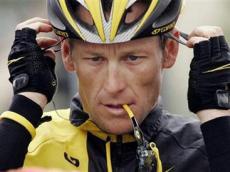|
|
TODAY.AZ / Weird / Interesting
New developments around 'doping story' of Lance Armstrong
11 October 2012 [09:42] - TODAY.AZ
 The Lance Armstrong story has just entered the realm of conspiracy thrillers.
The Lance Armstrong story has just entered the realm of conspiracy thrillers.The United States Anti-Doping Agency has charged that Armstrong is the centerpiece of, in the agency's words, "the most sophisticated, professionalized and successful doping program that sport has ever seen."
Eleven former teammates of Armstrong's are among 26 people who provided sworn testimony that the seven-time Tour de France winner used performance-enhancing drugs, encouraged others to do so and helped maintain the secrecy of the program.
"The [United States Postal Service] Team doping conspiracy was professionally designed to groom and pressure athletes to use dangerous drugs, to evade detection, to ensure its secrecy and ultimately gain an unfair competitive advantage through superior doping practices," the agency said in a press release. "A program organized by individuals who thought they were above the rules and who still play a major and active role in sport today."
Armstrong has consistently denied ever using any form of illegal drugs in the course of his historic career. In August he quit his fight against USADA, saying via statement, 'There comes a point in every man's life when he has to say, 'Enough is enough.' "
USADA assembled a thousand-plus-page paper trail of interviews, financial statements and lab results. Teammates who testified include George Hincapie, Tyler Hamilton, Floyd Landis and Frankie Andreu. The report, the agency contends, is "conclusive and undeniable proof that brings to the light of day for the first time this systemic, sustained and highly professionalized team-run doping conspiracy."
Armstrong has not commented publicly on the report. His attorney sent a letter to USADA Tuesday which states that USADA acted as "prosecutor, judge, jury, appellate court and executioner."
The testimony is a devastating blow to the legacy of one of the most decorated athletes in all of sports. Armstrong won the Tour de France seven consecutive times and is a cancer survivor. The Lance Armstrong Foundation, through its LiveStrong outreach, has raised more than $325 million to spread awareness and assistance to victims of cancer through the sale of more than 72 million iconic yellow bracelets.
But Armstrong has also been the most visible face of a sport consistently tainted by allegations of doping. He had for years appeared to ride above the charges that brought down many of his fellow riders, including Landis and Hamilton. But as sporting agencies began to voice concerns about Armstrong, he fought back vigorously and consistently, contesting the sampling procedures, the handling of his samples and even the motivations and objectivity of the testing agencies.
USADA began to zero in on Armstrong in 2012. In June, the agency filed official charges of doping and drug trafficking, suspending him from competition in both cycling and triathlons. Two months later, after years of court action and public denials, Armstrong decided to stop his fight against USADA.
As a result, USADA served Armstrong with a lifetime ban from sports that fall under its direction and stripped him of his seven Tour de France victories, though there is a difference of opinion as to who has jurisdiction over that process. UCI (International Cycling Union) insists it does, not USADA. The Tour itself will wait for the UCI's verdict on the validity of USADA's case. For the record, Armstrong is still listed as the winner between 1999 and 2005 on the Tour de France website.
Armstrong's problems aren't limited to the sporting arena. While a federal criminal investigation against Armstrong has been dropped, a Department of Justice investigation continues. It questions whether Armstrong and his teammates fraudulently used taxpayer money in the form of U.S. Postal Service sponsorship dollars to perpetuate the illegal doping program.
/Yahoo/
URL: http://www.today.az/news/interesting/113636.html
 Print version
Print version
Views: 2417
Connect with us. Get latest news and updates.
See Also
- 07 February 2026 [12:00]
Court allows Trump to detain immigrants without bond - 25 January 2026 [22:33]
Scientists solve 66 million-year-old mystery of how Earth’s greenhouse age ended - 20 January 2026 [14:34]
Spain train crash death toll rises to 41 after high-speed derailments - 19 February 2025 [22:20]
Visa and Mastercard can return to Russia, but with restrictions - 05 February 2025 [19:41]
Japan plans to negotiate with Trump to increase LNG imports from United States - 23 January 2025 [23:20]
Dubai once again named cleanest city in the world - 06 December 2024 [22:20]
Are scented candles harmful to health? - 23 November 2024 [14:11]
Magnitude 4.5 earthquake hits Azerbaijan's Lachin - 20 November 2024 [23:30]
Launch vehicle with prototype of Starship made its sixth test flight - 27 October 2024 [09:00]
Fuel prices expected to rise in Sweden
Most Popular
 Epstein files blur fact and fiction with shocking Biden ‘replacement’ claim
Epstein files blur fact and fiction with shocking Biden ‘replacement’ claim
 Zelenskyy claims US gave Ukraine and Russia a deadline to reach peace agreement
Zelenskyy claims US gave Ukraine and Russia a deadline to reach peace agreement
 Int'l Mugham Center holds magnificent concert
Int'l Mugham Center holds magnificent concert
 President Ilham Aliyev receives delegation led by Iranian Minister of Defense and Armed Forces
President Ilham Aliyev receives delegation led by Iranian Minister of Defense and Armed Forces
 Azerbaijan National Carpet Museum opens ‘Silent Prayers’ Exhibition
Azerbaijan National Carpet Museum opens ‘Silent Prayers’ Exhibition
 Gilavar Photo Club launches 'My Urban World' Int'l Photography Competition
Gilavar Photo Club launches 'My Urban World' Int'l Photography Competition
 Epstein files expose deeper ties with global scientific elite
Epstein files expose deeper ties with global scientific elite
